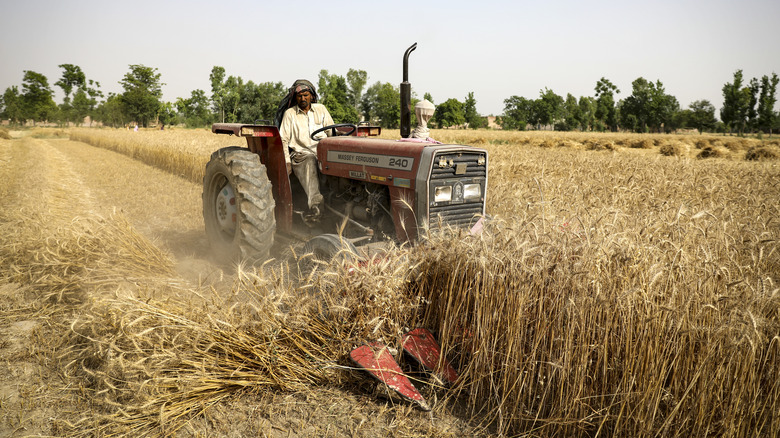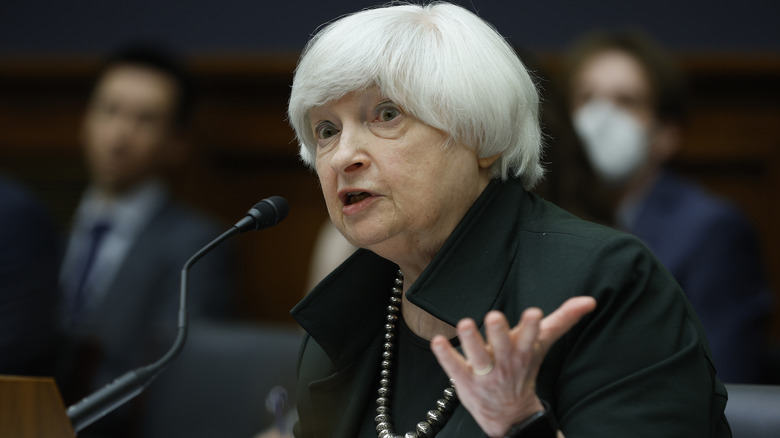A New Plan To Fight The Global Food Crisis Has Been Unveiled
As the Russia-Ukraine conflict rages on and climate change continues to ravage global crops and food supplies, concerns over a looming food crisis have deepened (via Time).
Last month, the World Bank issued a dire warning that global food prices could soon rise 37% as a result of sky-high inflation and the conflict in Eastern Europe — a number that will have devastating consequences for families, communities, and developing nations around the world, including increased hunger, food insecurity, large-scale economic collapse, and societal upheaval (via BBC).
The ongoing war in Ukraine poses a major threat to the world's wheat supply — about a third of the all wheat is grown in Russia and Ukraine — and the cost of transportation and fertilizer as Russia produces about 20% of the world's fertilizer and is a major oil supplier. Shortages of these key agricultural and food production resources all but guaranteed to create major disruptions in the global food supply chain.
This potential food shortage catastrophe would exasperate the already growing problem of global food insecurity. The U.S. State Department estimates that over 193 million people around the world experienced acute food insecurity in 2021, up a staggering 40 million from the prior year (via Al Jazeera). This year, an additional 40 million people could be added to that count.
In an effort to curb food insecurity, the U.S. Department of the Treasury has announced an ambitious multibillion-dollar plan that aims to aid those most affected by the global food crisis.
The plan hopes to tackle some of the issues caused by the global wheat shortage
In a press release, the U.S. Treasury revealed that some of the world's most prominent global development banks have agreed to join forces to alleviate some of the world's most pressing food production and distribution issues. The sweeping IFI (International Financial Institutions) Action Plan to Address Food Insecurity includes a number of global initiatives that will provide diverse aid through a variety of programs.
"The Russian war against Ukraine is the latest global shock that is exacerbating the sharp increase in both acute and chronic food insecurity in recent years driven by conflict, climate change and economic downturns, such as those associated with the COVID-19 pandemic," the release reads. "The IFIs are working swiftly to bring to bear their financing, policy engagement, technical assistance, and knowledge work to address rising food insecurity."
According to Reuters, the wide-reaching plan was first developed at a meeting of the World Bank, the European Bank for Reconstruction and Development, and the International Monetary Fund hosted by U.S. Treasury Secretary Janet Yellen in April. "Clearly Russia's war against Ukraine has exacerbated across the entire world the problem of food insecurity," Yellen said following a visit to a World Central Kitchen location in Poland. "The war's having an impact beyond Ukraine and it's something that we are very concerned about."
Tens of billions of dollars will go towards tackling agricultural and food supply issues
The plan – which is a joint effort of the European Bank for Reconstruction and Development, the Inter-American Development Bank, the African Development Bank, the Asian Development Bank, the International Fund for Agricultural Development, the International Monetary Fund, and the World Bank Group — pledges tens of billions of dollars of funding to support a range of agricultural and food supply programs.
According to the action plan, the IFI's primary goals include: "supporting vulnerable people, promoting open trade, mitigating fertilizer shortages, supporting food production now, investing in climate-resilient agriculture for the future, and coordinating for maximum impact."
In addition to the IFI Action Plan, Yellen has advocated for the passing of a U.S. Senate Bill that includes $5 billion in additional funding for food security issues. While it's unclear whether the sweeping plan will be able to successfully alleviate the growing pressure on the worldwide food supply, what is clear is that billions of people could be facing hunger, malnutrition, poverty, and worse if global leaders can't successfully come together to protect the world's most vulnerable.


